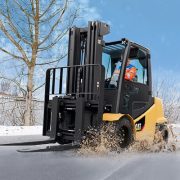Why regular forklift servicing is more important than ever in winter
A well-maintained forklift fleet means smooth operations and high productivity. Most fleet managers know to get their machines regularly serviced, but not many understand the importance of regular forklift servicing in winter. As most forklifts are operated in draughty warehouses or in cold, outdoor conditions, taking care of your forklifts in winter is vital.
Regular Forklift Servicing and Forklift Checks – what can you do?
As the temperature drops, so can the workings of your forklifts. Take a look at these tips to see how you can keep your fleet well-maintained and operating smoothly during the winter months.
Check your tyres
Checking both the tread and pressure of your machines’ tyres is vital during winter. It is always important to check your tyre tread is up to standard, but this is particularly important in winter to ensure proper traction on slippery and wet surfaces.
As the temperature drops, so can the pressure of your tyres. Lower pressure means lower speeds and higher chances of further damage to your machines.
Antifreeze
Check your forklifts’ cooling systems and keep that antifreeze topped up. Neglecting your forklift’s cooling system is one of the easiest ways to accidentally damage a machine – particularly one that works in extreme heat and freezing conditions during the winter and summer months. This is a simple check trained employees may also carry out, meaning you do not necessarily need to go to an expert to check this.
Windshields and windshield wipers
If your forklift has an enclosed cab, it is important to maintain the best visibility conditions for the operator, especially during the darker and rainier seasons. Inspect your windshields for any minor chips that could turn into larger cracks to prevent having to take a machine to the workshop mid-shift or take it out of action. It is also important to check your windshield wipers’ function and get any malfunctions or breakages fixed as soon as possible. Winter is already a time of low visibility. Making it harder for your operators to see due to faulty windshield wipers could lead to injury and damage within your workplace.
Check and replace your batteries
Changes in temperature can affect a battery’s life and cause it to malfunction. Whenever the season changes, it is a good idea to check your batteries. Use a test load to check your battery is still in optimal condition and replace any faulty batteries. Having one of your forklifts break down in the middle of a shift is never ideal, but feels particularly bad in the freezing winter’s rain.
Check your lights
Winter means the sun sets earlier and rises later. Chances are, your fleet operators will be starting and finishing work in the dark. It can be easy to put off repairing faulty lights during the summer months, but it is essential for your staff and machines’ wellbeing that every machine in the fleet has working lights. Winter also provides a great opportunity to upgrade lights from halogen to LED lights, which fare better in colder weather, and are brighter and longer lasting.
Driving technique
How you drive will also greatly help maintain your forklift. Encourage your employees or co-workers to let the machine warm up unloaded before being loaded and driven. Suddenly driving with a cold engine is not ideal for any machine. This is also true of forklifts.
Driving slower may also be necessary in winter as surfaces become wet and icy. Encouraging your employees to drive slower will help reduce the need for external maintenance due to crashes and scratches.
Winter can bring harsh and challenging conditions for your workers. With proper maintenance and caution, the colder months don’t have to impact your fleet’s productivity. Take proper time and care of your machines this winter, and they will repay you with reliability all year round.
Want to find out more about regular forklift servicing?
For more information on our regular forklift servicing, contact the team today.

